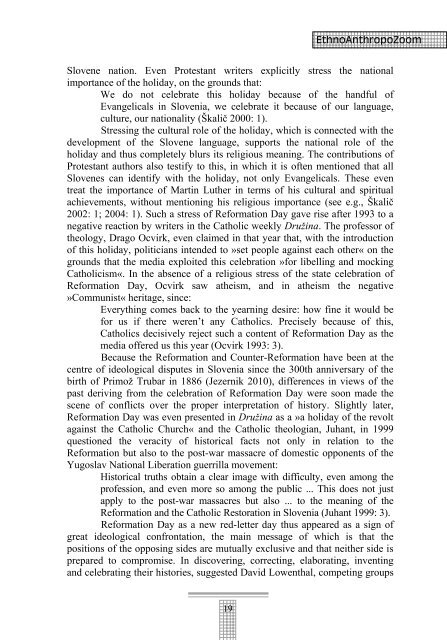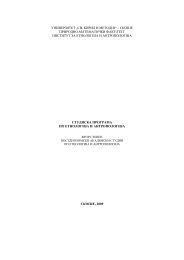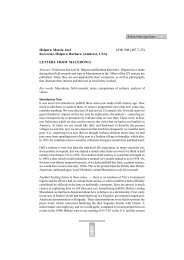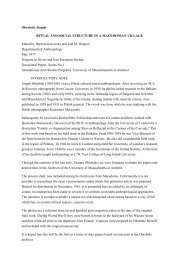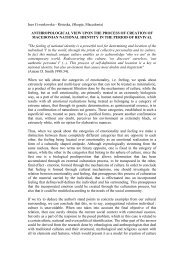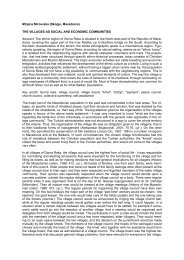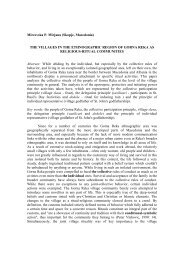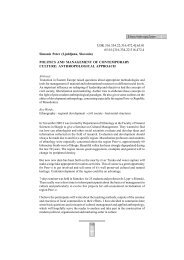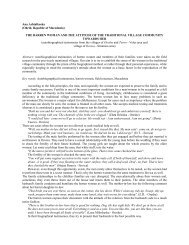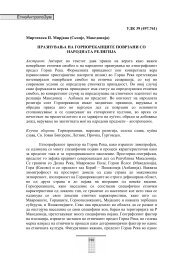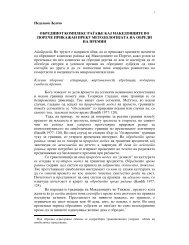Jezernik, Bozidar (Slovenia), The Red and the Black
Jezernik, Bozidar (Slovenia), The Red and the Black
Jezernik, Bozidar (Slovenia), The Red and the Black
Create successful ePaper yourself
Turn your PDF publications into a flip-book with our unique Google optimized e-Paper software.
EthnoAnthropoZoom<br />
Slovene nation. Even Protestant writers explicitly stress <strong>the</strong> national<br />
importance of <strong>the</strong> holiday, on <strong>the</strong> grounds that:<br />
We do not celebrate this holiday because of <strong>the</strong> h<strong>and</strong>ful of<br />
Evangelicals in <strong>Slovenia</strong>, we celebrate it because of our language,<br />
culture, our nationality (Škalič 2000: 1).<br />
Stressing <strong>the</strong> cultural role of <strong>the</strong> holiday, which is connected with <strong>the</strong><br />
development of <strong>the</strong> Slovene language, supports <strong>the</strong> national role of <strong>the</strong><br />
holiday <strong>and</strong> thus completely blurs its religious meaning. <strong>The</strong> contributions of<br />
Protestant authors also testify to this, in which it is often mentioned that all<br />
Slovenes can identify with <strong>the</strong> holiday, not only Evangelicals. <strong>The</strong>se even<br />
treat <strong>the</strong> importance of Martin Lu<strong>the</strong>r in terms of his cultural <strong>and</strong> spiritual<br />
achievements, without mentioning his religious importance (see e.g., Škalič<br />
2002: 1; 2004: 1). Such a stress of Reformation Day gave rise after 1993 to a<br />
negative reaction by writers in <strong>the</strong> Catholic weekly Družina. <strong>The</strong> professor of<br />
<strong>the</strong>ology, Drago Ocvirk, even claimed in that year that, with <strong>the</strong> introduction<br />
of this holiday, politicians intended to »set people against each o<strong>the</strong>r« on <strong>the</strong><br />
grounds that <strong>the</strong> media exploited this celebration »for libelling <strong>and</strong> mocking<br />
Catholicism«. In <strong>the</strong> absence of a religious stress of <strong>the</strong> state celebration of<br />
Reformation Day, Ocvirk saw a<strong>the</strong>ism, <strong>and</strong> in a<strong>the</strong>ism <strong>the</strong> negative<br />
»Communist« heritage, since:<br />
Everything comes back to <strong>the</strong> yearning desire: how fine it would be<br />
for us if <strong>the</strong>re weren’t any Catholics. Precisely because of this,<br />
Catholics decisively reject such a content of Reformation Day as <strong>the</strong><br />
media offered us this year (Ocvirk 1993: 3).<br />
Because <strong>the</strong> Reformation <strong>and</strong> Counter-Reformation have been at <strong>the</strong><br />
centre of ideological disputes in <strong>Slovenia</strong> since <strong>the</strong> 300th anniversary of <strong>the</strong><br />
birth of Primož Trubar in 1886 (<strong>Jezernik</strong> 2010), differences in views of <strong>the</strong><br />
past deriving from <strong>the</strong> celebration of Reformation Day were soon made <strong>the</strong><br />
scene of conflicts over <strong>the</strong> proper interpretation of history. Slightly later,<br />
Reformation Day was even presented in Družina as a »a holiday of <strong>the</strong> revolt<br />
against <strong>the</strong> Catholic Church« <strong>and</strong> <strong>the</strong> Catholic <strong>the</strong>ologian, Juhant, in 1999<br />
questioned <strong>the</strong> veracity of historical facts not only in relation to <strong>the</strong><br />
Reformation but also to <strong>the</strong> post-war massacre of domestic opponents of <strong>the</strong><br />
Yugoslav National Liberation guerrilla movement:<br />
Historical truths obtain a clear image with difficulty, even among <strong>the</strong><br />
profession, <strong>and</strong> even more so among <strong>the</strong> public ... This does not just<br />
apply to <strong>the</strong> post-war massacres but also ... to <strong>the</strong> meaning of <strong>the</strong><br />
Reformation <strong>and</strong> <strong>the</strong> Catholic Restoration in <strong>Slovenia</strong> (Juhant 1999: 3).<br />
Reformation Day as a new red-letter day thus appeared as a sign of<br />
great ideological confrontation, <strong>the</strong> main message of which is that <strong>the</strong><br />
positions of <strong>the</strong> opposing sides are mutually exclusive <strong>and</strong> that nei<strong>the</strong>r side is<br />
prepared to compromise. In discovering, correcting, elaborating, inventing<br />
<strong>and</strong> celebrating <strong>the</strong>ir histories, suggested David Lowenthal, competing groups<br />
19


